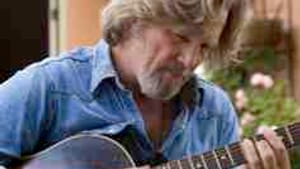Stay in the Loop
BSR publishes on a weekly schedule, with an email newsletter every Wednesday and Thursday morning. There’s no paywall, and subscribing is always free.
Jeff Bridges vs. Mickey Rourke: Kinder, gentler, and less effective
'Crazy Heart' vs. 'The Wrestler'

Crazy Heart opens with country singer Bad Blake (Jeff Bridges) arriving for a gig at a bowling alley in The-Middle-of-Nowhere, Somewhere-Out-West. We quickly learn two things about him: He used to be big, and he fell because he drinks. A lot.
Bad's life has been stripped down to one remaining relationship, with his agent, with whom he regularly talks on the phone. He no longer has his own band, instead playing with locals at each gig. Most of these musicians are happy to play with him; some are eager to learn from him, as had Tommy Sweet— now, apparently, a big star, though one whom Bad is reluctant to discuss.
Jean, played by the wide-eyed, subtly freckled Maggie Gyllenhaal, is an aspiring small-town reporter. Her uncle, a keyboard player in one of Bad's one-night bands, arranges for her to interview him, and the two hit it off. Bad is as charmed by Jean's four-year-old son Buddy as he is by Jean herself, and Jean and Buddy end up creating several kinds of change in Bad's life.
Confronting failure
Anyone who's seen both Crazy Heart and Darren Aronofsky's harrowing 2008 film The Wrestler, with Mickey Rourke in the title role, will inevitably compare them. Each is about a man emphatically past his prime who is still coasting on a reputation built years before.
Each man continues to perform out of some combination of love for his art and lack of alternatives. Each protagonist is forced to confront his numerous failures, both personal (as lover, father, friend) and professional (as performer, creator, mentor). Each man must decide how— and whether— to live his life going forward.
But the differences between the two films are also significant, and not just because Crazy Heart has a much better soundtrack. (I'm no country fan, but I bought the CD and have been happily listening to T-Bone Burnett's wonderful songs.) Crazy Heart is a kinder, gentler Wrestler, with an ending that's both more hopeful and less ambiguous.
Overlooked by Oscar
As significant as story and mood are in comparing the two films, though, is the relationship between the lead actor and his role. Bridges has deservedly received much praise for his Crazy Heart performance, including an Oscar and a Golden Globe. (Mickey Rourke was nominated for, but did not win, the Oscar for The Wrestler; he did take the prize at the Golden Globes and the Independent Spirit Awards.)
Bridges deserves the accolades. He can communicate as much with a squint or a shrug as other actors can with pages of dialogue. He's completely believable as an emotionally disconnected man going through the motions as he drinks himself to death.
Scandal-free in real life
I was, however, unable to completely forget that Jeff Bridges, unlike Bad Blake, has lived a stable, scandal-free life, married to the same woman for more than 30 years. This contrasts sharply with Mickey Rourke, once a handsome leading man (Body Heat, 1981; Diner, 1982) whose sporadic appearances in the tabloids over the years have kept us apprised of accusations of spousal abuse, a DUI, and a stint as a boxer. His battered face and body reflect numerous bad decisions before the camera begins to roll.
What is the more significant accomplishment for a film actor— to draw deeply on the life he has lived, or to communicate truths fundamentally at odds with his personal experience? It's certainly arguable that the less eventful real life of Jeff Bridges makes his performance a more impressive technical/artistic achievement.
For me, however, the facts of Rourke's life give his portrayal of Randy "The Ram" Robinson a resonance that's lacking in the Bridges portrayal of Bad Blake. A gut-level truthfulness seeps into every frame of The Wrestler, and that's missing from Crazy Heart.
Bad's life has been stripped down to one remaining relationship, with his agent, with whom he regularly talks on the phone. He no longer has his own band, instead playing with locals at each gig. Most of these musicians are happy to play with him; some are eager to learn from him, as had Tommy Sweet— now, apparently, a big star, though one whom Bad is reluctant to discuss.
Jean, played by the wide-eyed, subtly freckled Maggie Gyllenhaal, is an aspiring small-town reporter. Her uncle, a keyboard player in one of Bad's one-night bands, arranges for her to interview him, and the two hit it off. Bad is as charmed by Jean's four-year-old son Buddy as he is by Jean herself, and Jean and Buddy end up creating several kinds of change in Bad's life.
Confronting failure
Anyone who's seen both Crazy Heart and Darren Aronofsky's harrowing 2008 film The Wrestler, with Mickey Rourke in the title role, will inevitably compare them. Each is about a man emphatically past his prime who is still coasting on a reputation built years before.
Each man continues to perform out of some combination of love for his art and lack of alternatives. Each protagonist is forced to confront his numerous failures, both personal (as lover, father, friend) and professional (as performer, creator, mentor). Each man must decide how— and whether— to live his life going forward.
But the differences between the two films are also significant, and not just because Crazy Heart has a much better soundtrack. (I'm no country fan, but I bought the CD and have been happily listening to T-Bone Burnett's wonderful songs.) Crazy Heart is a kinder, gentler Wrestler, with an ending that's both more hopeful and less ambiguous.
Overlooked by Oscar
As significant as story and mood are in comparing the two films, though, is the relationship between the lead actor and his role. Bridges has deservedly received much praise for his Crazy Heart performance, including an Oscar and a Golden Globe. (Mickey Rourke was nominated for, but did not win, the Oscar for The Wrestler; he did take the prize at the Golden Globes and the Independent Spirit Awards.)
Bridges deserves the accolades. He can communicate as much with a squint or a shrug as other actors can with pages of dialogue. He's completely believable as an emotionally disconnected man going through the motions as he drinks himself to death.
Scandal-free in real life
I was, however, unable to completely forget that Jeff Bridges, unlike Bad Blake, has lived a stable, scandal-free life, married to the same woman for more than 30 years. This contrasts sharply with Mickey Rourke, once a handsome leading man (Body Heat, 1981; Diner, 1982) whose sporadic appearances in the tabloids over the years have kept us apprised of accusations of spousal abuse, a DUI, and a stint as a boxer. His battered face and body reflect numerous bad decisions before the camera begins to roll.
What is the more significant accomplishment for a film actor— to draw deeply on the life he has lived, or to communicate truths fundamentally at odds with his personal experience? It's certainly arguable that the less eventful real life of Jeff Bridges makes his performance a more impressive technical/artistic achievement.
For me, however, the facts of Rourke's life give his portrayal of Randy "The Ram" Robinson a resonance that's lacking in the Bridges portrayal of Bad Blake. A gut-level truthfulness seeps into every frame of The Wrestler, and that's missing from Crazy Heart.
Sign up for our newsletter
All of the week's new articles, all in one place. Sign up for the free weekly BSR newsletters, and don't miss a conversation.
 Judy Weightman
Judy Weightman